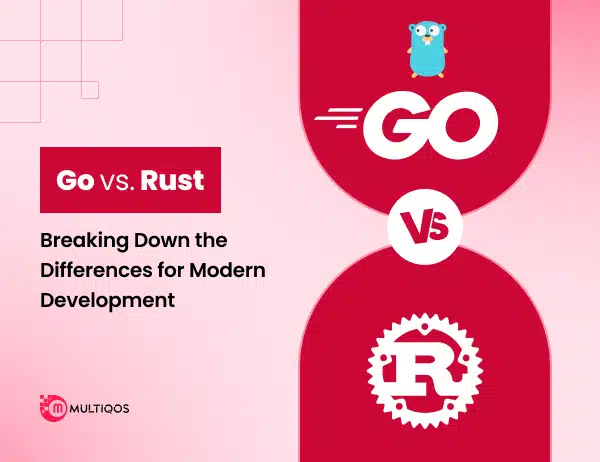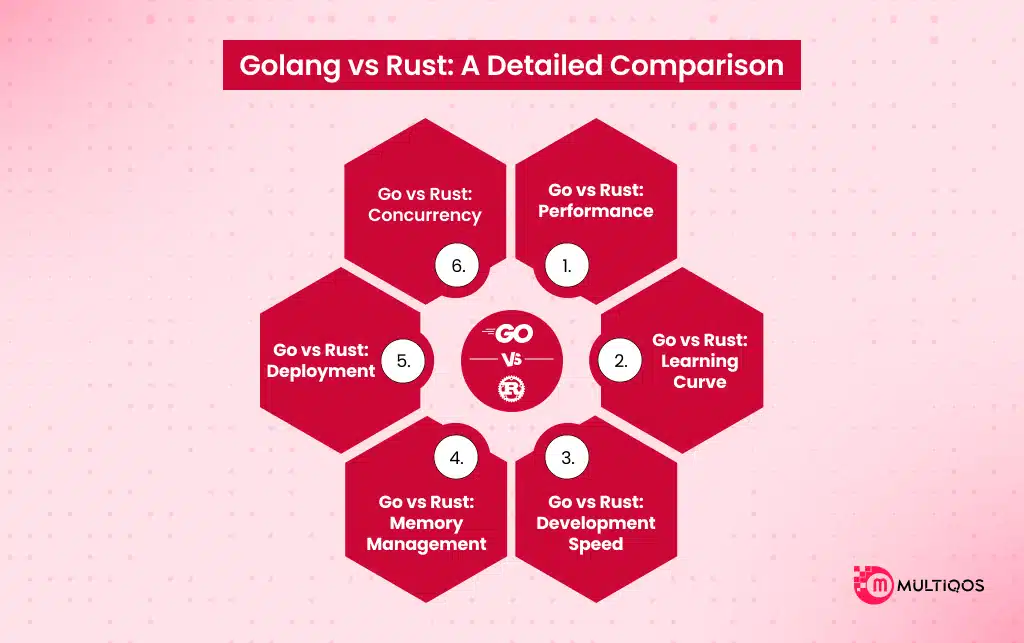Go vs. Rust: Breaking Down the Differences for Modern Development

Summary
While programming is always in flux, and there’s no telling what language will be the best after a decade from now, today we’re going to look at the most popular and influential programming languages to date. This blog takes a deep dive to compare these two languages in terms of performance, concurrency, memory safety, ease of use, and community support.
If you are building ultra-scalable web services or high-performance systems, Go vs Rust is important to understand: both have strengths and trade-offs. Read on to find out which one is more in line with where you want your development to head.
Introduction
In the constantly changing programming world, there is one question in every developer’s mind: which language to use? When it comes to the fight between performance and precision, two giants stand above the rest—Go vs Rust. Whether you love the ease and speed of Golang or you prefer the strength and safety of Rust, the Go vs Rust battle and rivalry are now popular than ever.
Whether it’s backend systems or high-speed cross-platform applications, whether you pick Golang vs Rust will have a big impact on how your application scales, matures, and the experience of your development team. Suppose you’re testing the ground about Golang development or are wondering about why Rust’s popularity is soaring. In that case, this guide will help you understand the differences and the optimal choice for you.
Go vs Rust: Language Overview
Both Go and Rust offer distinct advantages in the fight for modern programming languages. It is critical to comprehend their foundational principles and design intentions, as well as the philosophy versus pragmatism split, before selecting a language for your undertaking.
What is Go?
Go, also known as Golang, is a statically typed, compiled programming language created at Google in 2009. Go: Simple, fast, and scalable, Go is purpose-built for solving real-world problems in software systems at scale. It offers a clean and simple language syntax, fast compilation, and the advantages of concurrent programming provided by goroutines and channels.
The popularity of Golang development is attributed to the large number of cloud-native services, APIs, microservices, DevOps tools, and distributed systems, such as Docker and Kubernetes, for which the language is custom-made. It has an easy learning curve due to its intuitive design, which makes it the best option for teams who want productivity and maintainability.
What is Rust?
In 2010, Mozilla first released Rust, a systems programming language. Its safety, performance, and concurrency capabilities are developed without compromising the control of low-level memory management. Unlike Go, Rust incorporates an ownership model that removes data races at compile time, making a garbage collector unnecessary.
Rust is preferred for applications where performance and reliability are important, game development, operating systems, systems programming, IoT devices, and fintech. It’s also famous for enabling “fearless concurrency,” safe memory management , and zero-cost abstractions.
Golang vs Rust: A Detailed Comparison
Moreover, Go and Rust are adept modern languages. However, they excel in different fields. Here is the way they compete against one another in terms of critical development factors:
1. Go vs Rust: Performance
Just like C++, Rust is designed with maximum performance in mind. Its ownership model enables low-level control while eliminating the possibility of manual memory errors. The absence of a garbage collector allows for greater performance efficiency, particularly in CPU-bound tasks.
Go is moderately fast and achieves its speed at the cost of more complex requirements. Its garbage collector adds small pauses and degrades performance for low-latency systems, but Go is still adept for backend and web service workloads.
Winner: Golang for sufficient performance with easier management. Choose Rust for raw speed and control.
2. Go vs Rust: Learning Curve
Go is intentionally simple. With limited surface area for a language and few abstractions, it’s easy for developers without much experience to be productive rather quickly.
A lot of people have called out Rust for being tough to learn because of its strict compiler, complicated type system, and memory safety guarantees. But for this complexity, we get very strong guarantees.
Winner: Go for fast onboarding; Rust for developers committed to learning.
3. Golang vs Rust: Development Speed
Go is deliberately designed not to have much language to learn, and the standard library is quite small. For this reason, it’s extremely easy to learn and prototype with — perfect for quickly discovering and building projects.
Rust, however, has a higher learning curve and is more complex. Compile-time checks are strict (and sometimes annoying), but they catch a lot of errors earlier, which saves time in the long run.
Winner: Go if you prefer fast prototyping and shipping; Rust if you prioritize long-term stability.
4. Golang vs Rust: Memory Management
Rust provides us with manual memory management we know from C, but with none of the pitfalls: its own notion of ownership and borrowing makes it possible to not leak memory (at compile-time) and have no data races, without having a garbage collector.
Go uses garbage collection, which has many advantages for developers but can cause unpredictable pauses. It doesn’t work well for real-time systems, but it’s perfectly fine for general-purpose apps.
Winner: Rust for safety and accuracy of code; Go for simplicity and developer speed.
5. Golang vs Rust: Deployment
Go compiles to a single binary that runs without dependencies, so it’s easy to deploy. It can be leveraged for containerized environments and CI/CD pipelines.
Rust also compiles to very optimized binaries, but compile times may be higher, and there is a more complex toolchain. That said, Rust, in particular, is becoming more popular for WebAssembly and cross-compilation.
Winner: Keep choices simple; Go for simplicity and Rust for flexibility and cross-platform use.
6. Golang vs Rust: Concurrency
Go has first-class concurrency primitives with goroutines and channels, which make concurrent programming idiomatic and lightweight. It was designed with service and scalability in mind.
Rust uses a more sophisticated (but still safe) model of concurrent programming. Its ownership model and the Send and Sync traits make it safe to parallelize data access across threads, preventing race conditions at compile time—but you have to write a bit more code to do it right.
Winner: Choose Golang development for ease; Rust for safety and control in the high-stakes world of concurrency.
Go vs Rust: When to Choose What?
Deciding between Rust vs Go isn’t a question of one language being better or worse, it’s a question of suitability to your particular problem space. There are clear strengths in each language, and if you understand them, you can make sure you don’t get stuck with expensive mismatches down the road.
Choose Go if:
- You’re constructing web servers, microservices, or cloud-native apps.
- You value speed of development with a minimum of setup.
- Your team likes a simpler syntax and concepts to learn.
- You appreciate the ease of deployment via static binaries.
- You have a background in DevOps, automation, or networked systems.
Go excels at productivity, scalability, and concurrency, making it a fantastic choice for large Golang teams who need to ship quickly and iterate frequently.
Choose Rust if:
- You are developing very high-performance-oriented applications (such as game engines, OS components)
- You want some control over memory, but want nothing to do with those C/C++ dangers.
- You’re working on embedded systems, blockchain, or real-time computing.
- Your app requires ultimate reliability, security, and concurrency.
- You are targeting cross-platform, system-level, or WebAssembly development.
Rust provides outstanding performance and safety—ideal when you need both, even if you didn’t realize it.
Wrapping Up
Contrary to the “winner/loser” approach of the Go vs Rust debate, in this case, it is best to consider how well each option integrates with your specific requirements. Go is particularly favored for scalable web services, microservices, and cloud native systems because of its simplicity and fast development speed, and its built-in concurrency feature. Rust does systems programming and high-performance computing/work better since it has higher perf as well as memory safety (and just precision in general).
And, if you are in a rush to implement maintainable services with a vibrant developer community, hire Golang developers, as it might be a great option. But if you want exacting control over every bit and the highest guarantees on memory safety and performance, Rust might be the best option.
FAQs
The primary difference is focus: Go aims for simplicity and fast development with language-level concurrency, and Rust targets performance and memory safety through zero-cost abstractions. In the end, Go vs Rust is a choice between ease of use and fine control.
Go is easier to learn, particularly for newcomers or for teams that want to get up to speed quickly. Rust is more of an uphill climb as a result of its ownership model and its strict compiler, but results in a more potent mix of safety and performance.
Yes, you can definitely have Go and Rust in the same project if you can use them together via (FFI) foreign function interfaces or microservices. This makes it possible to benefit from Rust’s performance for the most critical part of your application and, for example, write the rest of the application logic, network I/O, or program control flow in Go.
You should hire Golang developers to quickly and effectively build cloud-native applications, APIs, or microservices. Go is ideal for groups that focus on speedy development, well-organized code, simple maintenance, and do not require extensive performance optimization at the level of fine-grained details.
Go is better for web development than Rust since it has a trivial grammar, compiles fast, and is good for creating a scalable web service. Although Rust can also be used in web development (especially with the aid of WebAssembly), it’s not as favorable due to its higher learning curve and longer development cycles.
Working with a specialized company lets you take advantage of skilled developers with deep experience in building scalable applicationslike microservices, backend APIs, and platforms that use Golang. Furthermore, these dedicated teams help clients with faster time-to-market, lower technical debt, and increased dependability with solutions focused on business objectives.
Get In Touch







